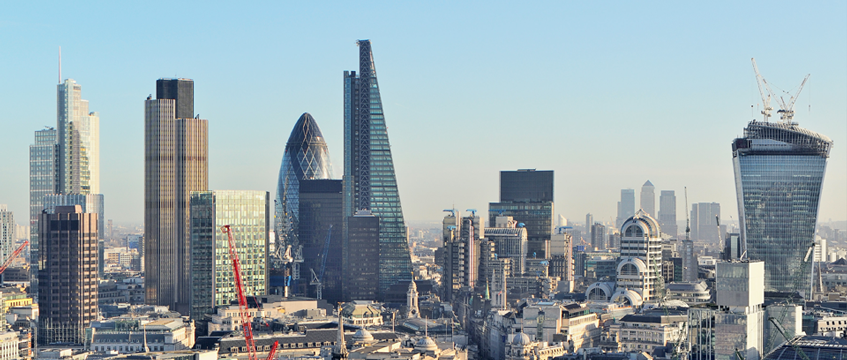Is there a mismatch between market sentiment and reality? Knight Frank thinks so. The discrepancy between gloomy headlines and uplifting data and forecasts was the theme of its central London breakfast event this morning.
Here are five areas where there is a perceived mismatch:
1. There are a lot of cranes – London has gone crazy and cranes don’t lie.
It turns out they do. There is currently 11.8m sq ft under construction at the moment, of which 42% has already been pre-let, according to Knight Frank.
Abby Brown, partner in Knight Frank’s central London leasing team, said: “The current development pipeline can only satisfy half of tenant demand. What I’m hearing from our tenant rep teams is that occupiers are increasingly nervous that there are limited options available to them, meaning that they are activating their requirements earlier and earlier, meaning for you as landlords the opportunity to pre-let has never been as strong.”
2. Prime rents will drop in central London
In 2017, rents on second-grade stock softened slightly but prime rents remained stable throughout the year and even accelerated in some submarkets, according to Knight Frank.
Looking forward, market dynamics are expected to remain strong and rents will remain stable during 2018. Between now and 2020 rental growth is forecast to average 7.5% across central London with Clerkenwell, Shoreditch and the Southbank being the strongest areas.
3. Tech companies like to do their own fit outs
Not so, says Knight Frank’s Silicon Valley expert, Bill Benton, executive managing director, Newmark Knight Frank (US). “When I show a tenant fitted out space they want to blow out competitors and ask, can we get a term sheet to them [the landlord] today?
“When a tenant sees this space and realise they don’t have to go through any of this [fit out], they don’t even care about the money at this point, the rent is whatever you tell them it’s going to be because they need that space right away.”
4. Co-working is for small start-ups
“Those of you locked into thinking co-working is for small tech start-ups need to thing again, and quickly,” says Knight Frank head of commercial research Lee Elliott.
Co-working increasingly works for corporates. In the US, Deutsche Bank, Microsoft, IBM and now Centrica in London, have placed more than 400 seats in co-working facilities.
Elliott adds: “The office is far from dead, but we must also recognise the form and function of the office is changing…Offices are no longer simply hubs for processing email.” London’s trend in seeing an increase in accelerator and incubator labs from a broad range of industries is expected to grow.
5. We are doing business in an environment of political turmoil
A soft Brexit is the most likely outcome and Labour leader Jeremy Corbyn won’t become prime minister any time soon. That is the reassuring opinion of Knight Frank chief economist James Robert. “A hard Brexit is a non-starter,” he says.
One explanation is the government’s dependency on the DUP rules out a Canada-style free trade agreement because there can be no border between Northern and Southern Ireland, with customs checks at the border.
EU countries are also likely to compromise to avoid picking up the UK’s £8bn annual EU contributions bill and risking impacting the trillions of euros raised in London for European firms.
French president Emmanuel Macron recently hinted that UK can have its special deal as long as it pays into the EU Budget and follows the rules.
Corbyn is also unlikely to have the chance of gaining power before the next scheduled general election in 2022. Fear of a Labour takeover will prevent the Conservative Party for calling an earlier election.
To send feedback, e-mail Louisa.Clarence-Smith@egi.co.uk or tweet @LouisaClarence or @estatesgazette











